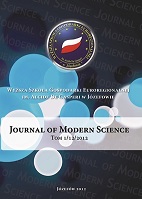Dylematy w wychowaniu: wolności i bezpieczeństwa, swobody i przymusu czy obowiązku…
Dilemmas in education: liberties and security, freedom and compulsion or obligations...
Author(s): Edward ErazmusSubject(s): Cultural Essay, Political Essay, Societal Essay
Published by: Wydawnictwo Wyższej Szkoły Gospodarki Euroregionalnej im. Alcide De Gasperi w Józefowie
Keywords: moulding of somebody’s character; impacts on education; traditional education; values; parental attitudes; history of education
Summary/Abstract: The study includes the perspectives of different dilemmas understood as problems, which are connected with choices of something or someone (eg. life goals, idea values, time and space, forms of realization by educational entities in agreement with own will and entirety of conditions, leading ideals and values that constitute humanistic process of education and self-education. For example there are such values as: liberty and freedom, safety and responsibility, justice and honesty, responsibility and coercion in awareness of children, teachers and also employees of educational and political-government institutions. From liberty follows the right of choice: values of education, goals and methods, scope of security, freedom and obligations - not frolics and external constraints. The limit for liberty is shaped for example by security of children. In dilemmas lies right to make mistakes, and as well obligation of pedagogical institutions to minimize uncertain situations - especially risky pedagogical actions made by parents, teachers and tutors, but also massmedia, politicians etc. The latter every day disrupt educational space by contradictory dilemmas - truths and wildness, myths and one-dimensional “opinions”. Thus, the essence is subjectivity. Its basis is freedom, responsibility, self-reliance, innovation, etc. It is not her objectification, manifested in the practice of teaching expectations and hopes, declarations and intentions, etc. The binder is the relations between liberty and the freedom of education, freedom and spontaneity, love and respect, dialogue and tolerance, etc., and child safety and protectiveness, responsibility and coercion more internal than external, etc. the first includes internal provisions, motives personal ambitions. These relationships concretes in several places of these study. 36 | WSGE Acts of freedom, democracy, dialogue or intimidation and coercion do not situated smoothly into the educational space. Living space determines the spatial behaviour of children and adults, both scales of independence, obedience and conflicts and restrictions for children and tutors in the country, city or region. Children and parents live in different places. It is hard to regulate the relations between obligations and duties, responsibilities and security and the inhibition or stimulation, empathy and assertiveness. The leading idea is the suggestion of Anthony de Mello, not to “teach pupils how they look, just to protect them from those who blind them”. There is always some space for free reflections, independent creative and restorative activities in the family, at school and outside of school. One of the topics is the question of the boundaries between such duties and freedoms of children, justice and coercion exerted by the school or family and career success either toxic or poor, overprotective, or chaos, not to mention the pathological families. Finally, it is worth to recall that t
Journal: Journal of Modern Science
- Issue Year: 12/2012
- Issue No: 1
- Page Range: 35-106
- Page Count: 76
- Language: Polish

